April 2018, UN Headquarters, Vienna, Austria
UNODC has consulted with approximately 4,000 judges from around the world and organized seven regional preparatory meetings over the last two years, to ascertain the successes and challenges faced by judges regarding judicial integrity, in line with article 11 of the United Nations Convention against Corruption. Ultimately, it is the recommendations expressed in these consultations that have provided UNODC with the basis for structuring the Global Judicial Integrity Network.

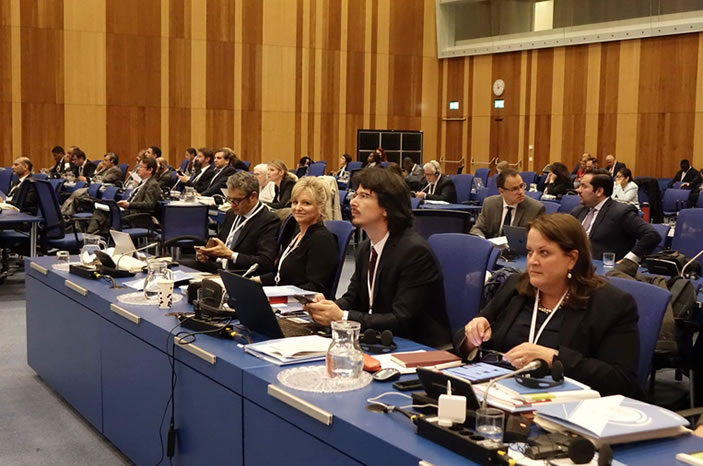
The launch event itself gave participants the chance to collaborate in person with other members of the judiciary, discuss key issues with Chief Justices from a variety of Member States, and provide recommendations on how members can work together to promote and strengthen judicial integrity through the Global Judicial Integrity Network.
During the launch, UNODC elaborated on the intended services and objectives of the Global Judicial Integrity Network, as well as took into consideration the findings of the participants. The final session of the event focused on the future activities of the Global Judicial Integrity Network.
Promotion of judicial impartiality and integrity are key objectives of the Global Judicial Integrity Network. The use of social media by judges poses challenges in meeting those objectives. While judges living in a modern world seek to conduct normal lives in a digital age, and try to balance their personal freedoms with their professional accountability, social media presents them with dangerous potential traps. Candid remarks on social media can indicate preferences and bias that undermine impartiality, and may even highlight potential conflicts that impact a judge’s integrity. As seen during the meeting of the Expert Group on Judicial Ethics Training Tools, judiciaries from around the world are looking for good practices and effective standards that can be implemented by their national judiciaries regarding the use of social media. During the panel, the participants discussed such recommendations based on collected best practices. They also heard first-hand about the positive aspects of social media, including its use for effective social outreach. Participation in such outreach activities is increasingly essential for the judiciary in building public support for their work.
Social media is a significant presence in the daily lives of people all over the world, including judges and judicial officials. This is especially true for younger judges, who have come of age in a digital world. Participation in various forms of new media forms by judges, however, gives rise to special ethical concerns and challenges. These include the propriety of content posted by judges, the unintended demonstration of bias or interest by a judge via his or her posts, and the unintended consequences arising from judicial interaction with third parties. The behaviour of judges on social media is visible to the public and therefore the activities of judges in their private life can harm the public trust in the judiciary as well as raise the question on impartiality and fairness of judge´s trails. On the flip side, social media can be an effective tool for outreach and public education. The use of social media may also challenge the public’s traditional perception of courts and judicial officers. At the end of the day, social media is also just a fact of modern life. A blanket instruction to judges to simply “stay off social media” is not a realistic directive in the current age.
The aim of panel Managing the Risks and Benefits of Use of Social Media by Judges was to identify and address some of the fundamental ethical implications for members of the judiciary of maintaining an on-line presence or using social networking, and to also provide practical recommendations and guidelines for judges on how to use social media ethically and responsibly. Contrary to some current guidance, we do not believe that an admonition to simply stay off of social media is realistic in today’s world. Limiting the use of social media by judges has been a recurring topic for discussion at the CEELI Institute, particularly within its Central and Eastern European Judicial Exchange Network, which is a platform for rising judges from the region, committed to addressing challenges related to strengthening the independence, integrity and accountability of the judiciary. The Network has identified examples and good practices that can be applicable beyond Central and Eastern Europe. These include the “Guidelines on Social Media Use for Judges”, developed by the Czech Union of Judges. These guidelines remain among the few existing formal recommendations for judges issued in any jurisdiction, to date.
The topic was presented by Network members who have significant expertise in this field. Included on this panel were Czech judge Ladislav Derka who is an author of the Czech guidelines on the use of social media by judges; Romanian judge Cristi Danilet who has significant experience with promoting and presenting his opinion on the judiciary and judicial issues via social media platforms, and who himself has thousands of followers on Facebook; and communication expert Ksenija Renko, JUPITER Strategic Consulting, from Croatia, who has recently cooperated on judicial communication strategy with Croatian Association of Croatian Judges and Ministry of Justice and has developed a series of recommendations for judges on how to behave on social media. Judge Barry Clarke, of the United Kingdom, who has spoken widely on this topic, also joined the panel. The outcome of the session is relevant to anyone responsible for setting guidelines for judicial conduct, including members of Judicial Councils, Court Presidents, officials from judicial associations, and any other members of the judiciary who need to set regulation on the behaviour of judges on social media. Those who are in the process of drafting or are thinking about drafting the Guidelines on Use of Social Media for Judges, Court spokespersons, or others responsible for public outreach and fostering better public understanding of the work of the courts.
The panellists pointed out that judges cannot completely stay disengaged from social media as it is a globally present part of life for a large number of the world’s population. Judges need to have an understanding of how social media influences public dialogue and communication in this day and age. The courts and national judiciaries should use this tool for outreach to the public, educating them and building trust in the judiciary. In this regard, the panellists encouraged the national judiciaries to elaborate judicial communication strategies, as well as guidelines on the use of social media. Guidelines on the use of social media are especially important for individual judges who have decided to be present on social media platforms. As there is no particular standard on these issues, judges often have to come up with their own individual solutions and approaches — which might lead them into situations involving conflicts of interests. Guidelines should set the limits on how to behave on social media in order to not undermine the integrity and independence of the judiciary. Guidelines should be developed based on good examples and best experiences that the judges have so far with the use of social media. It has been emphasized that all judges need to understand that although they might not be present on social media, their digital foot print might still be present in the virtual world and thus they need to take steps to secure their personal information in a way that will not have any influence on their independence and integrity. In this regard, effective judicial trainings should be provided on how to ensure the safe virtual environment for judges in order that they comply with judicial ethics.
Overall the judges agreed that global guidelines for judges on how to behave on social media are necessary. The CEELI Institute suggests creating a working group composed of judges, along with communication and legal experts, which will work on drafting “Guidelines on use of social media by judges”. The presenters and participants also agreed that judicial training on the security risks arising from their digital footprints has to be developed and introduced to judges globally. The judges should also be encouraged to educate their family members and friends about how their online activities can cause security risks for their relatives who are judges. The national judiciaries should be supported in the development and introduction of national communication strategies for the judiciaries. Social media is a useful tool to promote the judiciary and to exchange, effectively, information with the general public. Strategic approaches to this issue can help to improve public trust in the judiciary. Effective judicial training is essential to protect judges and to maintain compliance with ethical standards.
The judges discussed practical recommendations on how to behave on social media. Mrs. Ksenija Renko stressed that judges cannot stay away from the social media. It is the most effective way of communication because it provides real time news, increases public understanding and public trust and increases transparency and accountability. To use the media effectively, judges need to learn how to present their work in the media. Judges must carefully navigate their ethical concerns when communicating on social networks. That is not simple because the social media landscape is constantly shifting and there is often still no official guidance for judge’s communication on Social Media. Judges are forced to interpret rules on their own. To begin with, a judge must conduct all extrajudicial activities in a manner that does not interfere with applicable judicial codes of ethics. The fact that this kind of communication poses some risks does not mean that judges should stay away from social media. On the contrary, judges must maintain contact with the world in which they are asked to adjudicate. They must have an understanding of social circumstances, problems and dilemmas of people who appear before them. Social media is just one of the new communication tools and it is the behaviour and statements made by judges that can violate ethical duties – not the fact they are expressed on social media.
We live in a world where social media has become the main means of communication and it continues to develop rapidly. New possibilities for extended communication on the web and social media allow courts to communicate in completely new, creative and innovative ways and to ensure that courts are open, accessible and understandable to everyone. Social media actually offers a great opportunity for courts to meet the needs of their public and promote transparency for the purpose of supporting trust and confidence. Because of that, judges and courts should board that train. But they should also bear in mind that communication on social networks is neither simple nor harmless and that constant education of judges on a broad range of new media, on new communication principles, and about the technologies that make them possible is an imperative. Also, there should be clear rules that reflect common understanding of social media. These elements are of crucial importance for impartiality, integrity and transparency of judging in the 21st century.
The participants confirmed that judiciaries from around the world are looking for good practices and effective standards that can be implemented by their national judiciaries regarding the use of social media. Best practice guidelines will need to be developed which can suggest practices that will outline both the dangers and the value of social media usage. The CEELI Institute and the panel members and session participants are all among those willing to actively contribute to the creation of such a document. The participants recognized that the participation in social media platforms is an intrinsic part of modern life and that participation in such outreach activities is increasingly normal for judges. They also recognized that social media is an effective tool for the judiciary and individual judges to communicate with the public and to build public support and trust in their work.
October 2017, Ankara, Turkey
As one of the last activities under a European Union-funded project aiming at promoting an ethical culture in society, an international conference gathered the Minister for National Education Mr. İsmet Yılmaz, the Minister of Customs and Trade, Mr. Bülent Tüfenkçi, the representative of the EU Delegation to Turkey, Counsellor Dr. Michael Rupp, as well as other representatives and stakeholders, including experts from European countries and international organisations such as the UN Office on Drugs and Crime and Transparency International.


The €2.5 million EU-funded project aims at strengthening the Council of Ethics for Public Officials and NGOs, and entails 2 pillars: one Technical Assistance implemented with the Council of Ethics and one grant implemented with NGOs in the field.
Turkey set up a Council of Ethics for Public Service in 2004 and adopted a Code of Ethics for Public Officials in the following year. The Council is responsible for monitoring the implementation of this Code. Ethics commissions established in ministries evaluate ethical practices and make recommendations. The project provides technical support to strengthen the capacity of the Council of Ethics. It is supporting the Ethics Platform which is a tool established under previous EU funding, bringing together all relevant public institutions and civil society organisations. The platform is promoting ethics and developing strategies and policies in the field.
The EU anticipates that the outcome under this project will significantly contribute to a greater understanding of ethical standards, which will contribute to corruption prevention in Turkey and support the fulfilment of the Copenhagen Criteria for EU accession and the recommendations of the Group of States against Corruption (GRECO).
On the main panel on Global Concept on Prevention of corruption and Promotion of Ethics – International standards, good practices and different organizational models – were included Egidijus Radzevicius, Deputy director of Presentation of the Lithuanian Independent. Anti-Corruption Agency who presented Lithuanian Model in Preventing and Combating of Corruption; Ksenija Renko, Communication Expert, JUPITER Strategic Consulting Ltd., who presented Public Awareness Campaigns for Anticorruption and Promotion of Ethics implemented in Croatia and Serbia; Natali Phalén, Secretary general of The Swedish Anti-Corruption Institute for Business Sector who was talking about efforts to Prevent Corruption and Swedish Practice; Sigall Horovitz, Crime Prevention and Criminal Justice Officer from United Nations Office on Drugs and Crime who was talking about global efforts in prevention of corruption; Roberto Kukutschka, Researcher – Integrity Expert from Transparency International in Berlin gave presentation of the report on National Integrity System Assessment of Turkey”.
September 2017, Zadar, Croatia

The 3rd International Judicial Conference was dedicated to the role of contemporary judiciary in enhancing public confidence in the justice system by improving the efficiency of the judiciary and facilitating access to justice. For the first time in the Republic of Croatia, judges discussed the role of social media as an important communication channel that can significantly enhance communication between courts, journalists and citizens, with the aim of promoting confidence in the judiciary. One of the important topics was communicating in a global environment where spreading false information through social networks is becoming a serious threat.
The 3rd International Judicial Conference was organized by the Association of Croatian Judges in cooperation with the University of Zadar and with support of the Ministry of Justice of the Republic of Croatia, the U.S. Embassy in Zagreb, the City of Zadar, Zadar County and the CEELI Institute in Prague. The importance of this event was highlighted by Minister of Justice Dražen Bošnjaković, President of the Supreme Court of the Republic of Croatia Đuro Sessa and Mayor of Zadar County Božidar Longin as well as Program Director of the 3rd International Judicial Conference, judge Davor Dubravica.
The sole fact that 90 judges from 22 countries participated on 3rd International Judicial Conference also showed great interest in the topics. Participants were presented with the European Union Judicial Situation Survey 2017, developed by the European Commission as a comparative information tool to help its member states in improving the efficiency of their national judicial systems, thereby ensure quality, independence and efficiency of judicial systems.
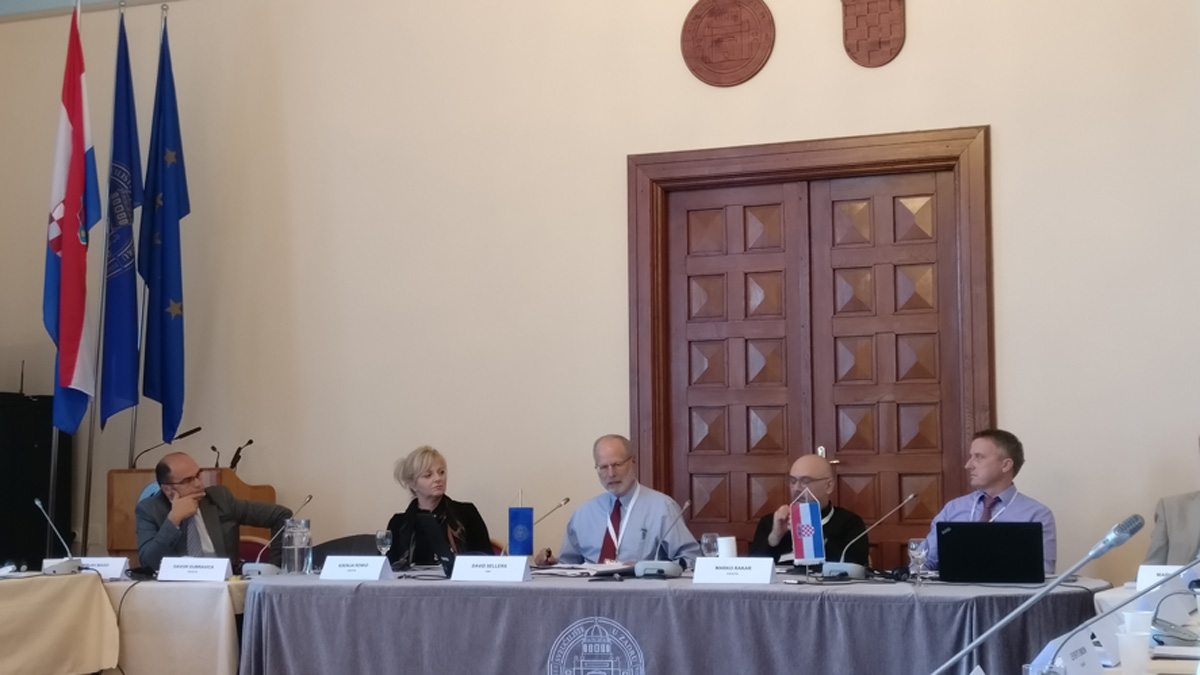
For the first time, new media were presented to the judges as important tools for effective court communication in changing world of communication – because they are significantly transforming the way people seek out information and provide opportunities for courts to listen to public concerns and to promote openness and accountability. Also, they can significantly encourage conversation between courts, journalists and citizens and seize the opportunity for courts to transparently promote trust and confidence in Judiciary. Undoubtedly, communication in environment where spread of false information through social networks is becoming a serious threat.
Mr. David Sellers, Assistant Director, Office of Public Affairs in Administrative Office of the United States Courts and communication experts from Croatia, Ksenija Renko, Jupiter Strategic Consultants, and Marko Rakar, Mrak services, addressed all those topics and open discussion on how to communicate and preserve faith and trust in Judiciary in a post-truth era when facts and truth are no longer privileged and when so called “alternative facts” do not care about objective standards or factual accuracy.
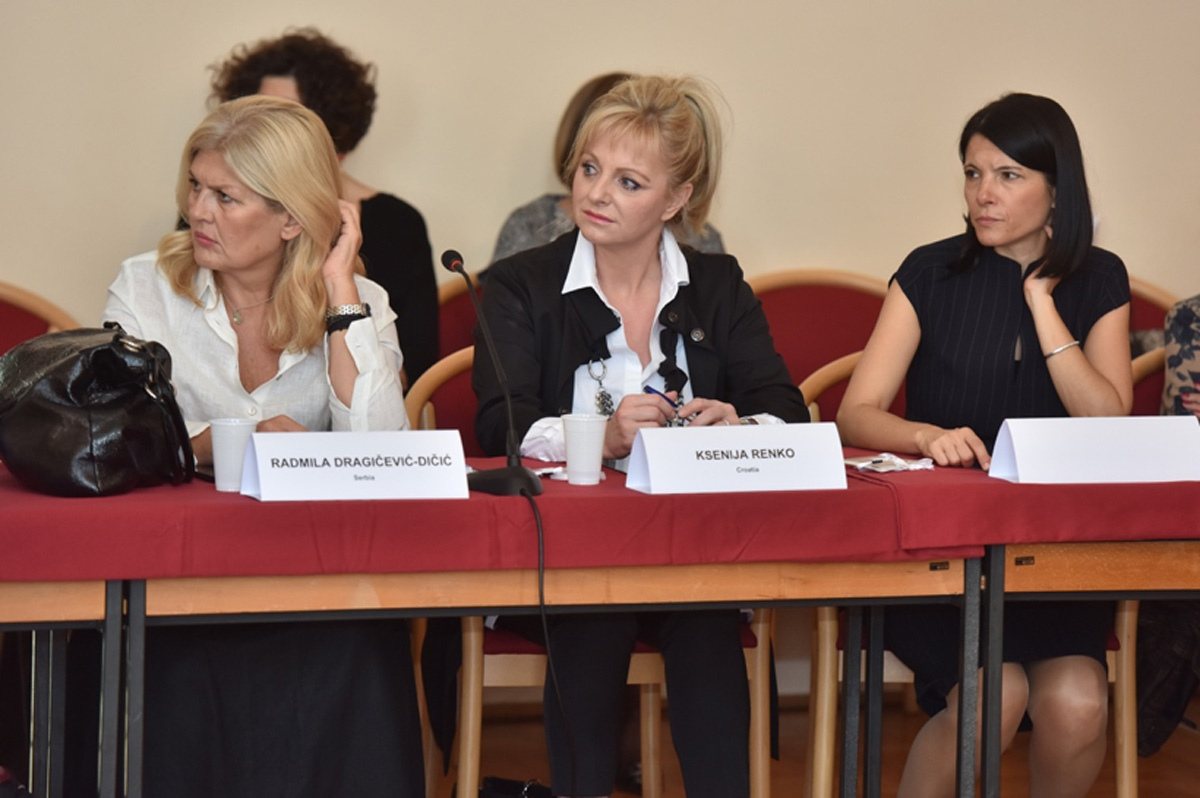
Presenters also provided judges with good practices in court communication on Internet and different social networks, such as judge’s communication on Facebook, LinkedIn, Instagram, Twitter, blogs etc. (sharing photos from holidays, socializing, dating…), sharing links on topics that can become future cases which involve some of the judges, prosecutors or attorneys. Main questions which were addressed and opened debate were: Is this kind of communication adequate for Judicial profession – or not? Should Judge be a member of online social networking community? Should Judge use social network to comment recent political and social issues? Is LinkedIn appropriate for judiciary profession? If we consider two main professions in judiciary practice – lawyers and judges in e.g. LinkedIn world, we could face the next three relevant questions: Should lawyer accept an invitation to connect from a judge? Should lawyer send an invitation to connect with judge? Should lawyer endorse judge’s legal skills or write a recommendation on the judge’s profile page – or vice-versa?
All those topics were highly appreciated and discussed among the participants as judges in CEE countries face huge pressure from the media, especially when handling politically sensitive cases and high-level corruption cases.
October, 2016, Ohrid, Macedonia
The purpose of the International Judicial Conference organized by the Supreme Court of the Republic of Macedonia, The Macedonian Judges Association and The CEELI Institute in Prague, and with the support of the Embassy of the United States in the Republic of Macedonia as well as Bureau of International Narcotics and Law Enforcement Affairs, was to strengthen the capacities and cooperation between associations of judges, the European Network of Judicial Chambers and other relevant partners and to establish standards to strengthen the independence of the judiciary by reviewing and re-examining the provisions of all types of judicial responsibility – of criminal, civil or disciplinary liability. Enhancing transparency of judiciary towards media with adequate respect of the principles of an independent judiciary, rights of individual and protection of public interest was also one of the important initiatives of this conference.
International Judicial Conference was opened by Ms. Lidija Nedelkova, President of the Supreme Court of the Republic of Macedonia, David Stephenson, Pol/Econ Chief, US Embassy to the Republic of Macedonia, Christopher Lehmann, Executive Director the CEELI institute in Prague and Judge Djemali Saiti, Ph.D., President of the Macedonian Judges Association
The main goal of the International Judicial Conference was to initiate legislative reforms by making recommendations, as well as strategic judicial reform guidelines that will guarantee fair trial, strengthen judicial independence, transparency and accountability, and promote regional commitment to the rule of law. The lack of debate between judges and the exchange of good practices and experiences was the main motive for this regional co-operation which will further strengthen the capacities and co-operation of regional associations of judges, the European Judicial Council Network and the CEELI Institute, resulting in the publication and dissemination of detailed information, reports and joint publications, judicial opinion surveys and analytical documents.
The topics on importance of communication with the media and the public and communication as a basis for building trust were presented by international judges and experts with significant expertise in this fields. On the panel on relation between media and judiciary were included Judge Wlodzimierz Wróbel, Supreme Court of the Republic of Poland, Judge Faik Arslani, Supreme Court of the Republic of Macedonia and communication expert Ms. Ksenija Renko, Jupiter Strategic Communication, from Croatia.
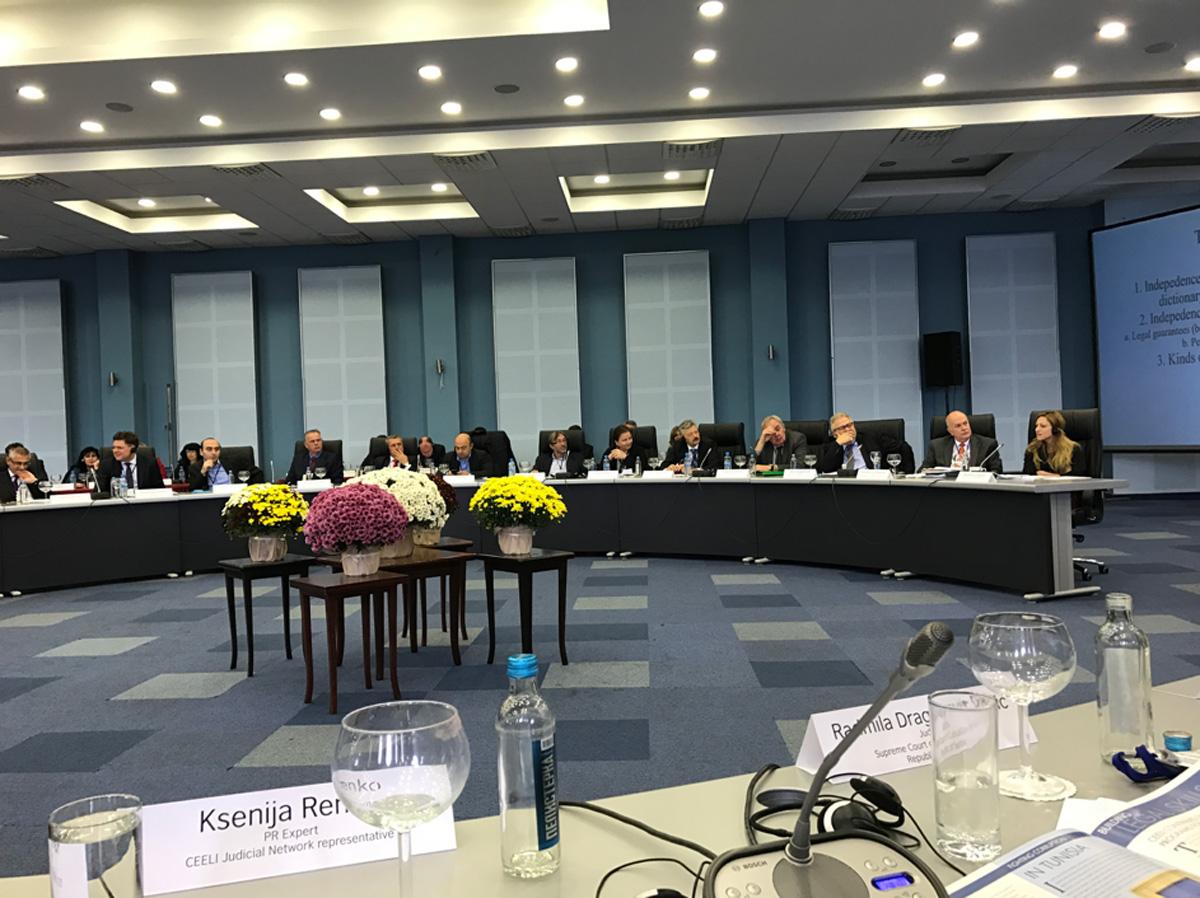
Very often judges are subject to public and media influences. Although their personal opinion must not have an impact on the judicial decision in any case – not only because public and media opinions are often legally irrelevant, but also because they are often based on incomplete or fabricated information – sometimes such public criticism is a consequence of dissatisfaction of certain parties or interest groups, especially when it comes to a process that is of significant public interest. Due to such pressure, judges sometimes bring unexpected and surprising verdicts. Consequently, the public tends to interpret their decisions as unjust, due to common belief that they were brought under pressure from certain interest groups. In this context, one must consider the fact that a judge, considering a psychological angle, is also open to the influence of the media as any other human being. With an aim to protect and save independence and impartiality of judiciary, judge’s professional duty is to be resolutely and indisputably responsible in their communication with public and media.
To perform successfully its noble and demanding mission, courts need to improve and settle a sustainable system of strategic communication. Such system will allow efficient and effective functioning because the courts should become a place where all employees have to own organization’s mission and vision, its social goals and common values to share. They must know individual and team assignments and be familiar with the information flow. In a situation when external communication is constantly under public scrutiny, the high-quality internal communication is a must for the organization such as the court. Successfully designed and implemented, internal communication provides good functioning of the organization and satisfaction of employees who work there. It gives the opportunity for professionals to share their opinions and suggestions about the work they do, about their working environment, motivation, and above all provides a secure and reliable flow of information, which are mainly of a very delicate and confidential nature.
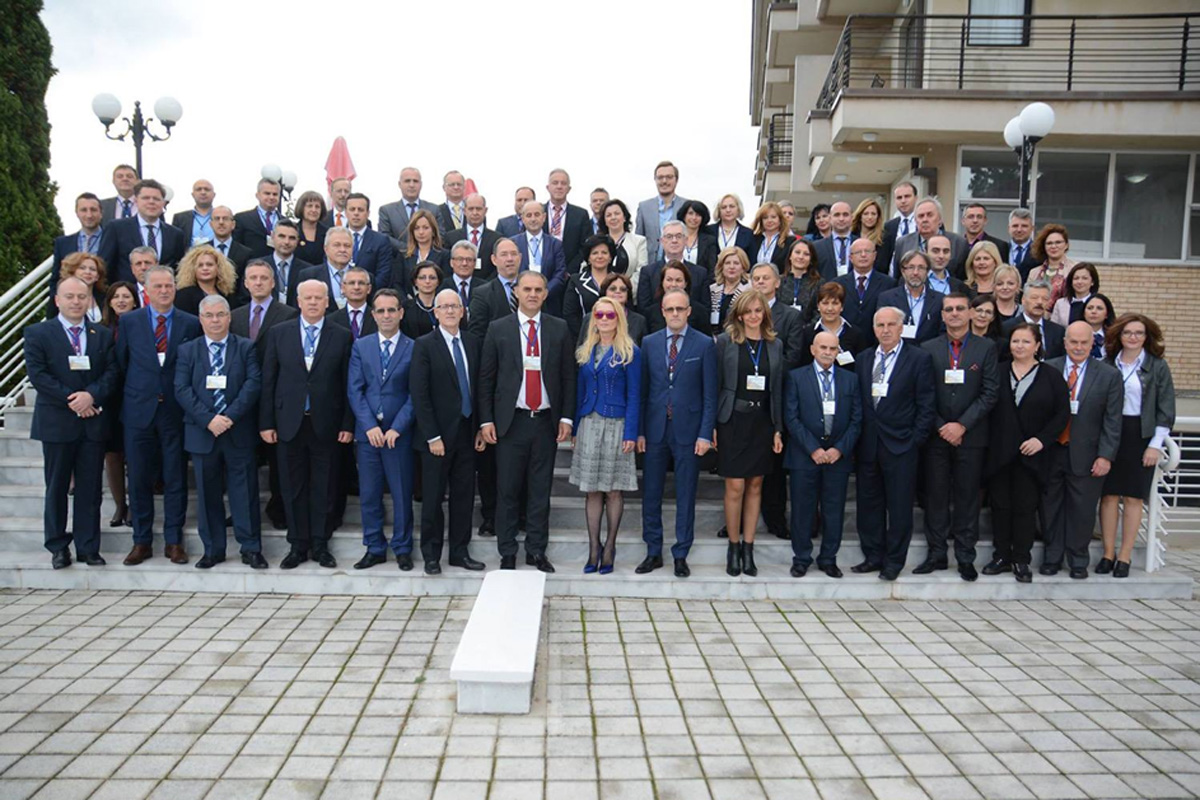
Due to the importance of public interest and the necessity to follow legal norms, judicial profession is by its nature considered to be within the field of crisis communication. For this reason, it is necessary to pay special attention to every aspect of the content of the crisis protocols, to the training of its users, and to define very clear guidelines about what to communicate, who communicates it, how often and in what way.
Being aware of the above, and in compliance with the court development strategy, the leaders and the judges have to decide to undertake the necessary step and to invest their time and resources in upgrading the system and culture of internal communication on courts. These communication basics may seem clear and unambiguous. However, in a new set and demanding organizational systems such as courts, organization encounters numerous obstacles and hurdles in every day communication: because of the sensitivity and complexity of its work, remarkable public exposure of the organization, the scope of work and the number of employees.
March 2015, Sarajevo, Bosnia and Herzegovina
The workshop, intended for NGOs and public institutions’ communication officials that deal with various aspects of corruption, was held on 20th March 2015 in the conference hall of Hotel Europe in Sarajevo and organized in order to transfer knowledge and best practices from the region and the world to the participants of this event.

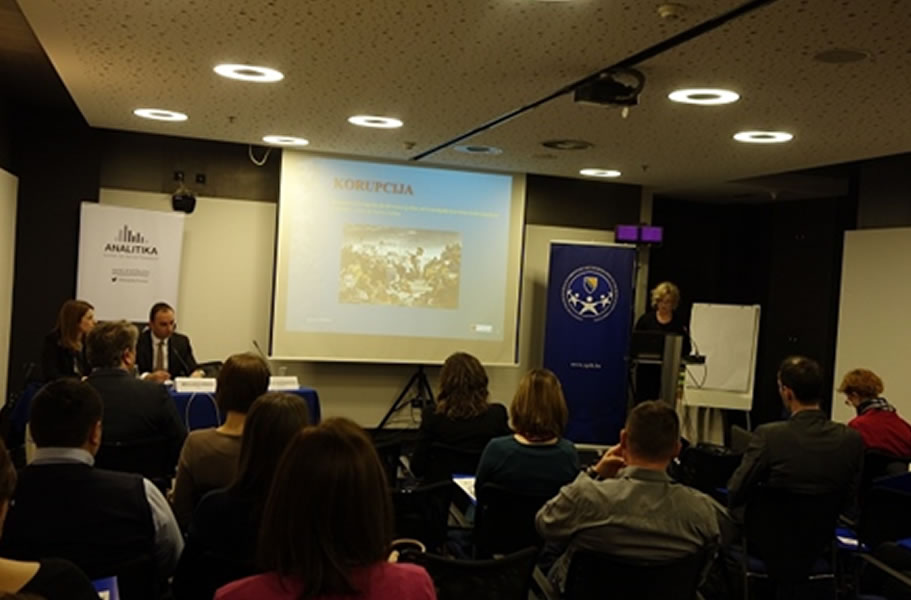
The workshop was organized within the project “Strengthening the Communication Capacity of the Agency for Prevention of Corruption and Coordination of the Fight against Corruption of Bosnia and Herzegovina“, implemented by Center for Social Research Analitika, and funded by the British Government. The event was organized in partnership with the Agency for the Prevention of Corruption and Coordination of the Fight against Corruption. Within four sessions, the speakers presented basic principles, concepts and approaches, as well as practical examples of the most recent anti-corruption campaigns.
In the opening session, Ksenija Renko, JUPITER Strategic Consulting, communications expert from Croatia, presented methodology and two examples of anti-corruption campaigns conducted in the Republic of Croatia. On this occasion, Mrs. Renko stressed the importance of environment analysis and research before and after the implementation of a campaign. The emphasis of her presentation was on partnerships with various sectors, particularly with the media in the format of investigative journalism. Campaign Officer of Transparency International UK Alice McCool gave an overview of anti-corruption campaigns in international perspective. She concluded with several crucial factors necessary for the success of anti-corruption campaigns: the relevance of topic, cooperation with the media and the creation of key messages differentiated by target audiences.
Head of PR Unit of the Agency for Fight against Corruption of the Republic of Serbia Lidija Kujundžić presented the components of the recently implemented anti-corruption campaign of the Agency, and particularly pointed out the procedures related to funding and implementation of campaigns, primarily those funded by the European Union in EU countries and countries in the accession process. The workshop concluded with the presentation by Jurgita Razmyte from the Public Relations Division of the Special Investigation Service of the Republic of Lithuania, who directly worked on implementation of a national campaign to fight corruption.
October 2014, Banja Luka, Bosnia and Herzegovina
The 10th Proactive jubilee conference at Kozara brought together prominent communication professionals from across the Region. Reputable theorists and practitioners have shared their experiences and knowledge with a number of conference participants, addressing the key values and challenges facing PR practitioners in the modern, economic, social and technological environment. In the past decade, annual Proactive Conferences have initiated important processes of strengthening and professionalizing the PR profession in Southeaster European countries.
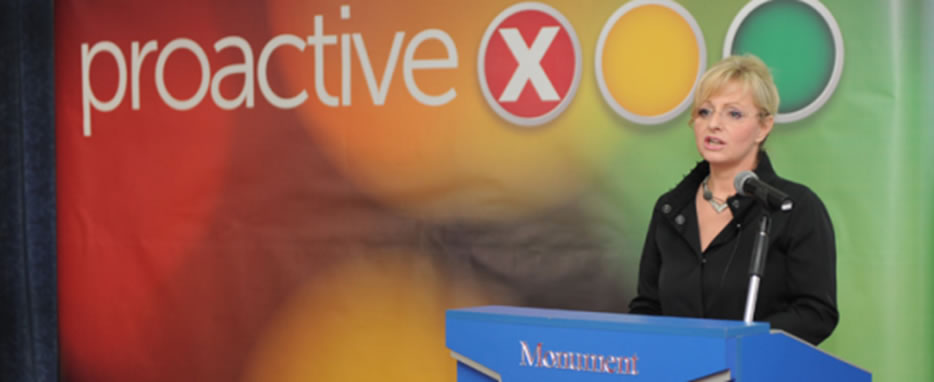
Prominent regional communications experts at this year’s Proactive Conference raised questions about ethics in public relations, lobbying in the future, new social and public order in the world, changes in foreign investors’ interest in public space in the Region, organizational culture, new business trends and management, and new trends in Internet communication. The introductory lecture on ethics was delivered by Ksenija Renko, communication expert, Jupiter Strategic Communication. The most prominent practitioners from the Region, Drenislav Žekić, Dragana Đermanović, Peđa Ašanin Gole, Miloš Čirić, Brane Gruban, Robert Čoban, Dragan VaragiĆ, Vojislav Žanetić and Vladimir Vulić spoke about lobbying, the impact of digital communications on society and public space, organizational culture and media in time of transformation.
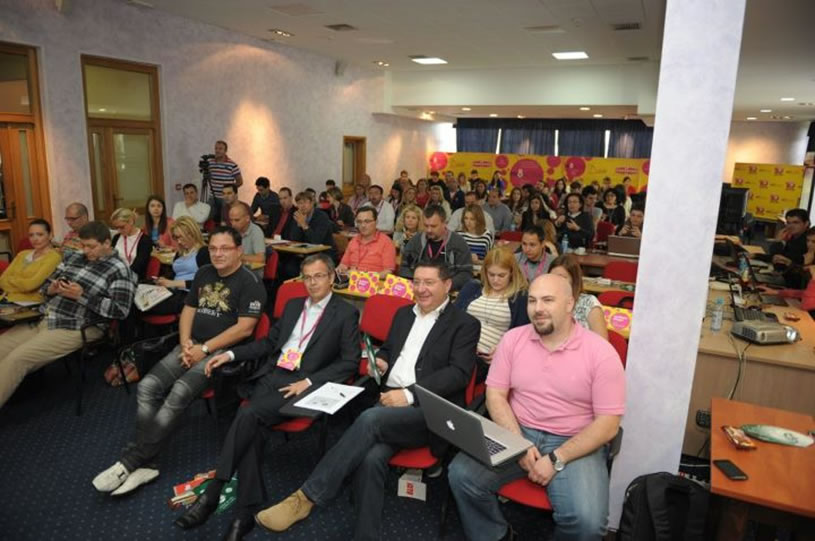
Dragan Močević, the founder and author of the 10th Proactive Conference, was handed a special acknowledgmentby the most recognized regional experts, lecturers and participants of all Proactive conferences in the last ten years.
“This recognition is an expression of great respect and gratitude for all the efforts that Dragan Močević has made over the years, connecting and bringing together PR professionals from across the Region. In spring 2005, Dragan organized first Proactive Conference in Banja Luka and gathered us in a small hotel near the river Vrbas. Since then, we became permanent lecturers at his traditional conferences. We recognized ourselves as experts but also as good friends. Gathering PR professionals across the Region at Proactive in Banja Luka, Kozara and Vlašić for the past 10 years, Dragan fellfield his mission of raising awareness of the importance of the public relations profession, as well as the mission of bringing together top professionals, good people and friends. And to paraphrase a famous slogan, I would say – Dragan connected people. It is an honour to congratulate my friend and colleague Dragan Močević for the outstanding contribution he has made in developing and promotion of the public relations and communications profession in the Southeast Europe countries as well as his exceptional creativity, great effort and dedication to our idea”, said Ksenija Renko, Communication Expert, Jupiter Strategic Communication.
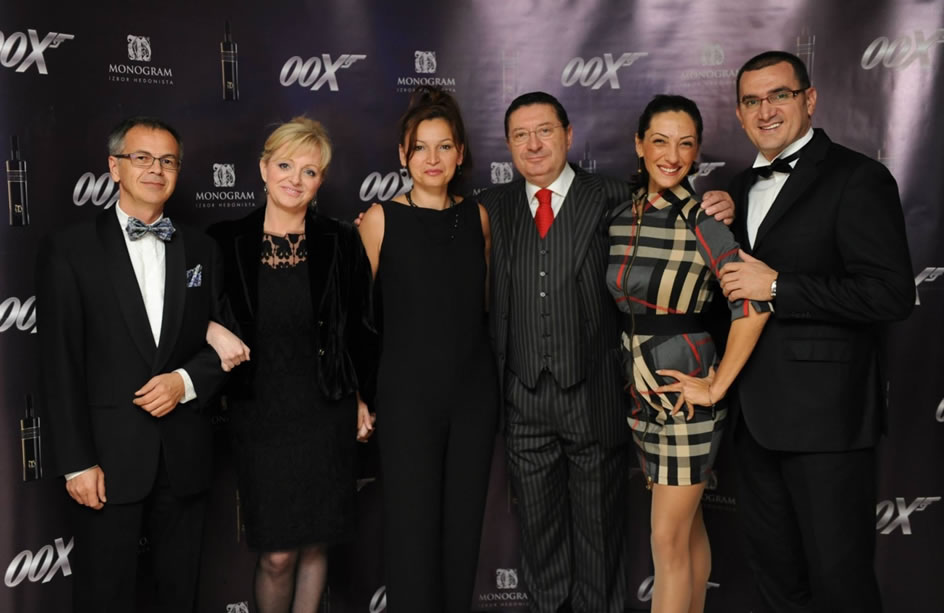
As an important communications event that has been bringing together the best and most knowledgeable communicators across the region for the last ten years, Proactive has been transformed into a Proactive Club. PROven in ACTion and VEnture Club of professional communicators who continue the mission of raising ethical and professional standards in public relations and have a vision of positioning public relations at the top of management structures in organizations across the Region.
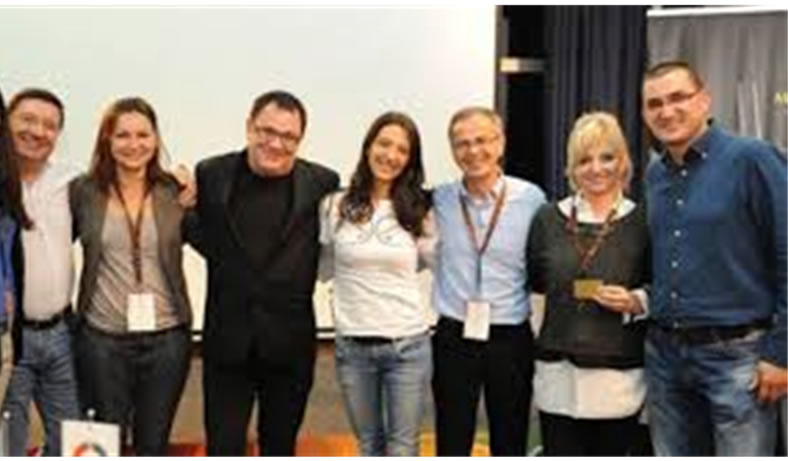
“For ten years, Proactive has been pushing the boundaries of public relations, not only in Bosnia and Herzegovina but throughout the Region, thus becoming synonym for the gathering and networking of PR professionals. This year’s Proactive will round off a powerful story which connected a large number of communication professionals from different countries in a common mission to strengthen the profession, establish standards of good and modern public relations, and pioneer the introduction of new trends in everyday communication. Proactive is a practical example of how important strategic communication is for a story to be recognized as something that creates good value, whether relating to the acquisition of new knowledge or networking so important to our profession”, says Dragan Močević, founder and author of the 10th Proactive Conference and Proactive PR Club.
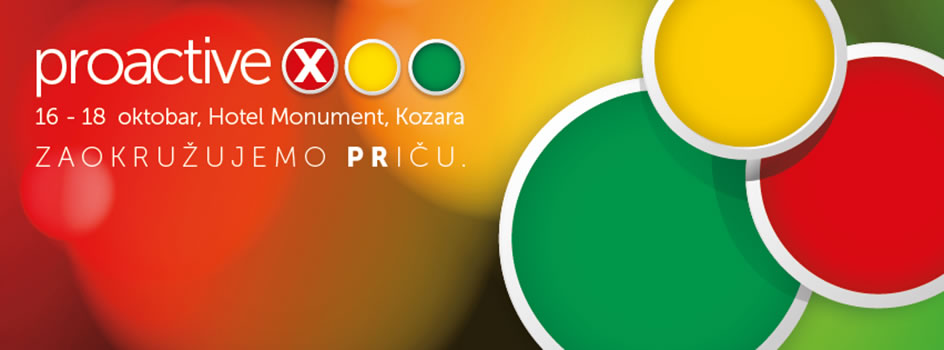
The first Proactive Conference was held in 2005 in Banja Luka, with the aim of promoting public relations, strengthening the status of the strategic function of communicators within organizations and companies, exchanging experiences and establishing and establishing regional cooperation in the field of PR. Over the course of 10 years, this event and the people gathered around it have pushed the boundaries in learning and implementing new and innovative communication strategies, channels, tools and trends, as well as brought together and connected a large number of PR practitioners from numerous organizations, institutions and companies across the Region.
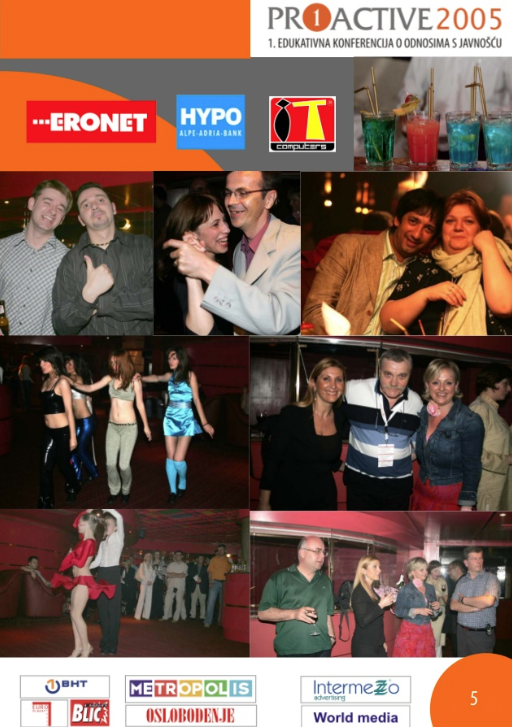
November, 2012, Belgrade, Serbia
Corruption and anti-corruption policy are a long-term political problem in Serbia. Fight against corruption at the national and local levels is one of the biggest challenges on the road to the European Union. That was the main message of the Anti-Corruption Forum held in Belgrade on November 21, 2012 at the Palace of Serbia, organized by the Anti-Corruption Agency of Serbia with the support of the Delegation of the European Union to Serbia and Serbian government.

The first Serbian Anti-Corruption Forum, part of the project “Supporting the Work of the Anti-Corruption Agency” – EU IPA 2008, was attended by more than 200 prominent representatives of the Serbian public administration, companies, non-governmental organizations and media, as well as experts in the field of corruption prevention from Serbia and abroad. Serbian Prime Minister and Internal affair Minister Ivica Dačić said in their address that the fight against corruption is one of his government’s priorities and that corruption undermines the rule of law, democracy, human rights and economic development.
“The weakness of any link of the institution in the system involved in the fight against corruption is reflecting in the stability of the whole system. An important role can be played by each individual if confidence in the integrity of state institutions is developed,” said Dačić, adding that Serbia did not move far in building the system to combat this social disease. He also recalled that Serbia had enacted a number of anti-corruption laws and proved that most corruption cases happened in public procurement for public companies, in cases of appropriation of certain statuses such as disability pension, start-up loans, as well as in the work of judicial authorities, cases of abuse of office in state and local government bodies, as well that corruption is noticeable in the work of educational and health care institutions and in the police. Dačić expressed his expectation toward all entities to fully contribute to the implementation of the national and action plan to combat corruption.
The Head of the European Union Mission in Serbia, Vincent Degert, said that the media has a special role to play in the fight against corruption and that regardless of the Government’s views, it is necessary to build a public view that no one is above the law. Degert said that Serbia had not made progress in the fight against corruption, and suggested that a new strategy be drafted, whose implementation would be constantly monitored. “Serbia’s position on the anti-corruption performance scale is low. We have to consider the fact that Serbia has stagnated in this regard and I would say that it has been in decline for the last year. That is an alarm bell,” Degert said, recalling that even EU member states were invited to step up their fight against corruption. He announced that as early as December 2012, prosecutors and judges in Serbia would attend a special training in the topics of fight against corruption.
Serbian Minister of Justice and State Administration Nikola Selaković said that awareness of the fight against corruption and the harmfulness of corrupt behaviour was needed. “The media ranked fourth in terms of corruption in European statistics. In the first place there are political parties, in the second the police, and in the third, the judiciary,” Selaković said, pointing out that main problem is that citizens perceive but do not report corruption because of fear or rather their indifference and disinterest since they perceive corruption as a common occurrence. “Corruption is reported only if you trust the state and the local community, if you stand up and point your finger,” Serbia’s justice minister said. He announced a whistle blower protection bill with an aim to protect any person reporting corruption in the community or in the workplace.
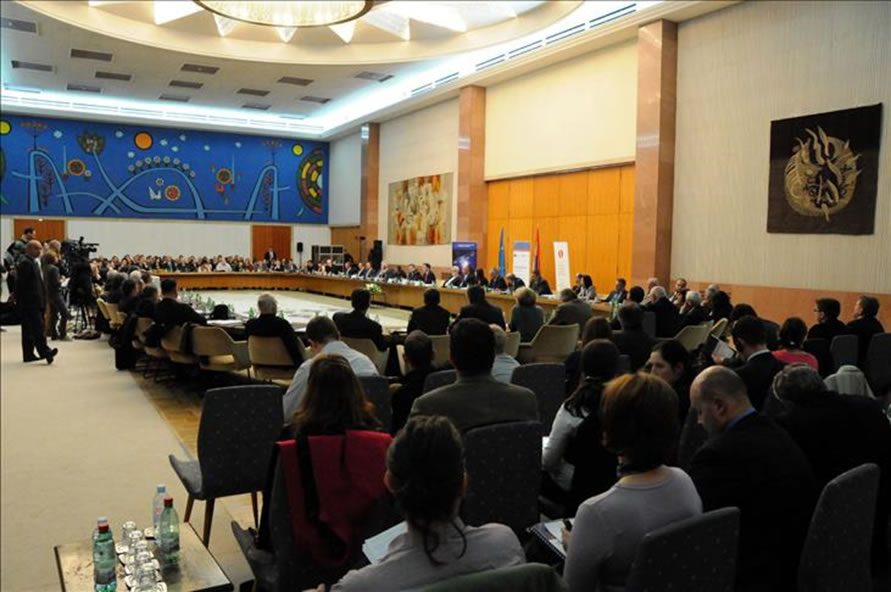
The Chairman of the Board of the Anti-Corruption Agency, prof. Zoran Stojiljković presented the results of the Agency’s research conducted in cooperation with CeSID in spring 2012, which shows that the citizens of Serbia have a good understanding of the problem and causes of corruption. Citizens believe that the work of the state administration is one of the causes of corruption and more than 70% of them do not believe that state institutions are capable of protecting the public interest. Almost 90% of citizens believe that every institution must be responsible for preventing corruption “in their own house.” Yet, no institution can overcome this problem alone, as it is supported by the fact that more than 70% of citizens believe that better inter-institutional cooperation and coordination would make results. More than 70% of citizens believe that the fight against corruption would produce better results if both repressive and preventive methods were used.
Also, more than 80% of citizens believe that corruption also consists of the use of public resources in the personal and political interests of the tycoon, just like donating of officials or doing favour for something that is considered to be a regular job of an official. Almost 80% of citizens recognize nepotism, and more than 70% of citizens believe that corruption is an influence of different interest groups on the work of institutions. As professor Stojiljković pointed out, complicated and non-transparent procedures in the work of institutions, lengthy procedures and large discretionary powers, insufficient control and accountability in the work of civil servants, especially executives are considered the cause of corruption by the most citizens.
Following the plenary session of Anti-Corruption Forum, three parallel panels dedicated to combating corruption in public administration, in public and private companies, and in the media and civil society organizations were held. Panel participants discussed the ways how different sectors can contribute to the successful fight against corruption as well as of the importance of a personal example to counteract corrupt behaviour. The objectives of the Anti-Corruption Forum were to share best anti-corruption experiences and to improve the cooperation and coordination of the Anti-Corruption Agency with representatives of the public administration, business sector, civil society organizations and the media in Serbia.
Anti-Corruption Awareness Raising Campaign
“Corruption Steals the Future”
As a part of the two-year EU funded project “Supporting the Work of the Anti-Corruption Agency” IPA 2008, an integrated Anti-Corruption Awareness Raising Campaign has been designed and implemented to raise public awareness on the importance of preventing and fighting corruption. The national Anti-Corruption Campaign “Corruption Steals the Future” was awarded with silver by the Association of Market Communications of Serbia (UEPS). The communication campaign was conducted by Ksenija Renko, a senior communications expert from Croatia and Jasmina Krstic, communications expert from Serbia. The creative concept was conceived by the drafting agencies of DraftFCB + Afirma, and the video was directed by Srđan Golubović, author of the films Absolute One hundred, Trap and Circles. Awareness Raising Campaign was launched on March 30, 2013 and included integrated communication through various channels: television, radio, internet, leaflets, posters, brochures, social media, special events and PR activities. The micro-site of the campaign has gone live and today the address www.prijavikorupciju.rs is very active – citizens use it to report corruption cases in their environment.
March, 2011 Zagreb, Croatia

The conference ‘Croatian Media in the Fight Against Corruption’ gathering journalists, publishers and media owners opened at the Westin Zagreb Hotel on Tuesday, 1 March 2011. The conference is co-hosted by the Croatian Ministry of Justice and the Delegation of the European Union to Croatia. The conference is a part of the ‘Strengthening Anti-Corruption Inter-Agency Cooperation – Awareness Raising Campaign’ project financed through the EU IPA 2007 program for Croatia.
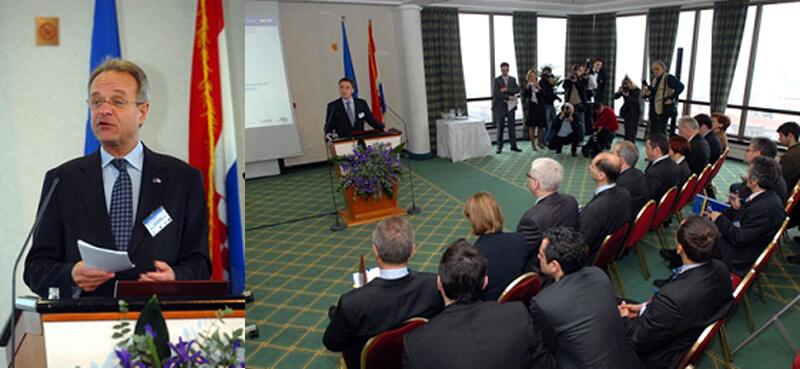
The conference was opened by the Head of Anti-Corruption Sector in the Ministry of Justice Davor Dubravica who stressedthe goals of the conference: to recognize, transfer and exchange best anti-corruption experience in the media, to provide suggestions to raise awareness and sensitivity in the public of everyday forms of corruption, to get feedback on the knowledge of the Government’s Anti-Corruption Strategy, to give suggestions for better media coverage of the anti-corruption campaign in Croatia, to consider the theoretical, historical and legal aspects of struggle against corruption, to analyze investigative journalism as the best media tool for struggle against corruption, to analyze and learn from anti-corruption cases from the region, to analyze and learn from anti-corruption cases in Croatia so far, and to educate journalists about the struggle against corruption.
Welcome addresses were given by Secretary in the Ministry of Justice and Project Leader Tihomir Kralj, State Secretary Tatjana Vučetić, and the Head of the EU Delegation to Croatia, Ambassador Paul Vandoren. He pointed out that the EU has financed anti-corruption related activities in Croatia since 2002 with a total sum of EUR 33 million. Around EUR 20 million has been spent by now, while nearly EUR 900,000 will be spent in this Awareness Raising Campaign led by Key experts Constantin Palicarsky and Ksenija Renko.
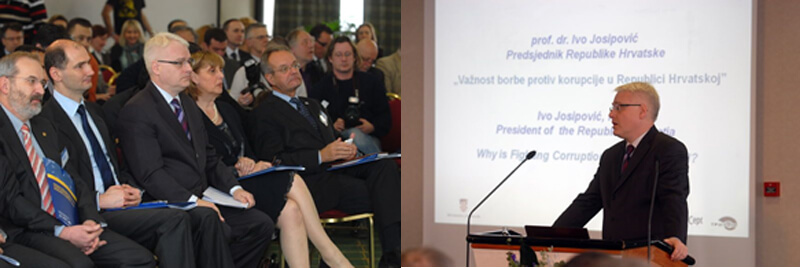
The opening address was given by CroatianPresident Ivo Josipović, who described the last two years as an important turning point which shows that things in Croatia will never be the same again, in the sense that nobody involved in corrupt conduct can feel protected any more. The president said that he was often being asked whether Croatian society has become more just. The difficult economic situation, the president stressed, does not testify to that, but it does point at changes in the attitude towards corruption, given that some of the highest-level officials are under investigation. The president also emphasized a higher level of optimism among the citizens, as evidenced by recent opinion polls. He claimed that this shift in public opinion came into being as a result of an increase in the number of corruption-related lawsuits, which was confirmed by the State Prosecutor’s Office. The president mentioned the code-names of all big legal cases in which high-level state official were arrested and pointed out that, unfortunately, corruption is present in the media, too. There are corrupt individuals, situations where the media are blackmailed by advertisers, and the issue of censorship. Mr Josipović also stressed the fact that the media should by and large be credited for uncovering corruption affairs.
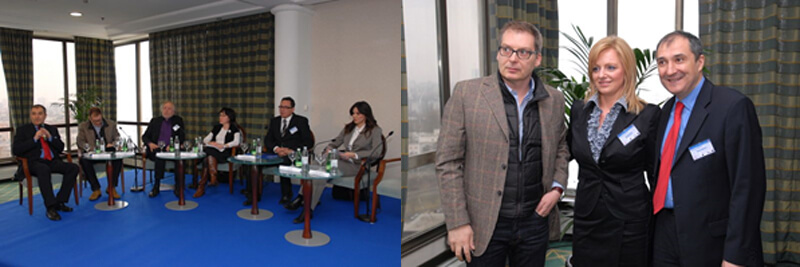
The media conference involved round tables, presentations by notable Croatian and international experts and Croatian journalists with experience in covering anti-corruption efforts, as well as discussions of all participants. A panel discussion called ‘Balance of Croatian Media in the Fight Against Corruption’ was held with participation of Nova TV News Section director Iva Gačić, HTV acting director-general Josip Popovac, T-Portal editor-in-chief Alemka Lisinski, Croatian Journalists’ Association President Zdenko Duka and Jutarnji list deputy editor-in-chief Igor Alborghetti. The panel was moderated by freelance journalist Dražen Rajković. The participants discussed the following topics: whether 1 July 2009, the day when former PM Ivo Sanader submitted his resignation, represented a turning point for a more open and more energetic media coverage of corruption affairs; why Croatian media were not critical enough in writing about Sanader and his governance model while he was still in power; how they assessed the implementation of PM Jadranka Kosor government’s anti-corruption policies; if Croatian media contributed sufficiently in the fight against corruption; and what the media and their publishers should do to improve this struggle in the immediate future.
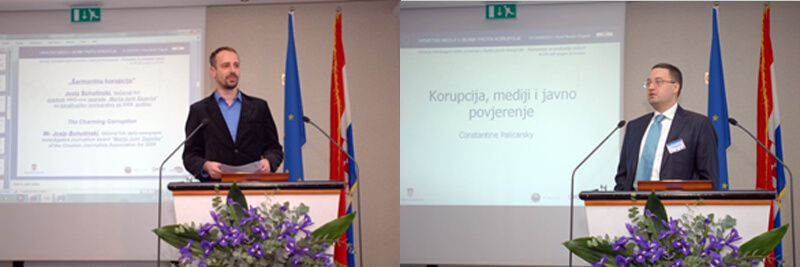
The third part of the first day saw the following presentations: ‘Charming corruption’ by Večernji list journalist Josip Bohutinski, who had won the 2009 HND award for investigative journalism and who presented the case of corruption in HAC (Croatian Motorways); ‘Corruption, media and public trust’ by international expert Constantine Palicarsky; and ‘Organized crime and corruption – the local impact of a global issue’ by honorary lecturer at California’s Stamford University and a member of the Board of the International Centre for Journalists Paul Radu.
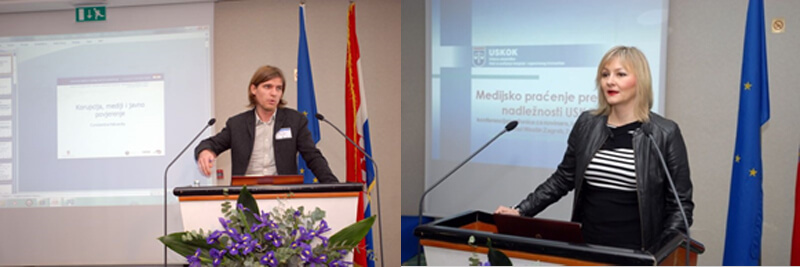
Deputy Head of USKOK Nataša Đurović held a first speech on the second day of the Conference, entitled ‘Media coverage of cases under USKOK’s competence’. She fully confirmed the individual’s right to freedom of expression, the freedom of media and the public’s right to information access. However, she also stressed that legislation in all well-organized countries, including Croatia, allows public authorities to limit the public’s rights to information access in certain exceptional cases, e.g. during the course of judicial proceedings and judicial investigations. For breaches of confidentiality of proceedings, pursuant to the Criminal Code, a fine or sentence to imprisonment is envisaged in Croatia. Nataša Đurović stressed in particular the importance of media keeping confidential the identity of protected or endangered witnesses. She also commented the recent instances of media publishing statements made by certain important witnesses related to corruption cases, which, as she stated, did not leak from USKOK, and which she characterized as largely, yet not entirely authentic, which she attributed to the attempts to influence the course and outcome of judicial proceedings.
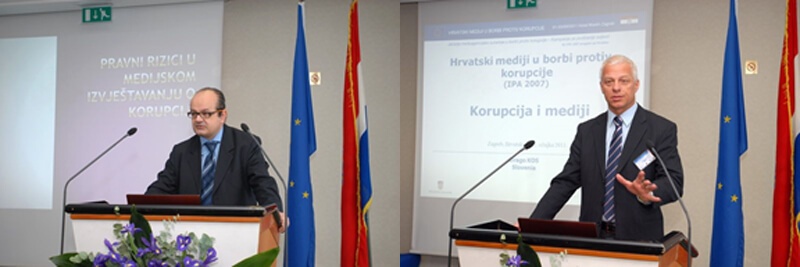
Lawyer and media law expert Emil Havkić addressed in his presentation the legal risks involved in media coverage of corruption. He described in detail the chronology of attempts by the Croatian authorities over the past two decades to legally limit space for independent press to reveal corruption affairs. He pointed out that the public authorities in Croatia have a constant tendency of broadening for journalists and citizens the area of confidentiality. After a certain ‘relaxed’ period, aspirations to limit the freedom of public speech have grown stronger recently. The proposal in the most recent amendments to the Criminal Code foresees the sentence to imprisonment for up to one year as a sanction for defamation. In addition, a so-called institute of shame is introduced. All of this could have restrictive influence on media reporting on corruption cases.
Former Chairman of the Slovenian Corruption Prevention Commission and Chairman of the Group of States against Corruption (GRECO)Drago Kos spoke about the relationship between corruption and the media. In his opinion, the media have significant influence on the prevention of corruption, both directly and indirectly. The main obstacles to freedom of press include media ownership, dependency on financial impacts of advertising, fear of negative reactions, reliance on official sources of information and limited access to information. Credibility of the media is diminished when securing the existence and position in society is preferred over informing the public in an objective, impartial and responsible manner. Media and the press bear particular responsibility for the preservation and enhancement of free press, for thorough information checking, adherence to principles of legitimacy, democracy and integrity and for the preservation and building of awareness about threats caused by corruption.
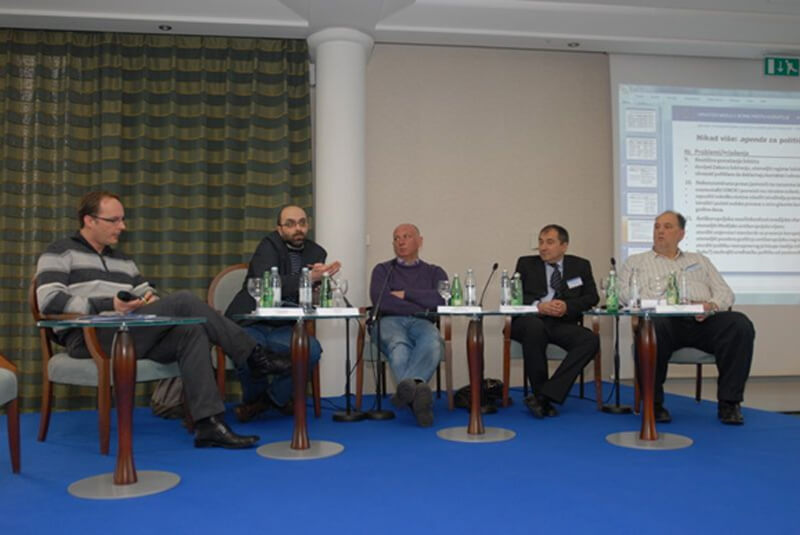
Program of the Conference also included two panel discussions on investigative journalism case studies. The discussion on the first journalist panel was opened by Jutarnji list journalistGordan Malić with his presentation ‘Politics, media and corruption – Is integrity enough’. Malić pointed out that opening anticorruption processes is accredited to the change in the political leadership because no other changes took place. The fight against corruption resulted in the criminalization of HDZ, but not of the oligarchy that benefited from arrangements with Ivo Sanader and is now seeking its place in the future. HAC managers are in prison, but not the owners of contracted companies and their subcontractors who were used to embezzle billions of kuna from the budget. In Gordan Malić’s opinion, the opposition is mistaken in claiming that the reasons for the fight against corruption will cease to exist once they are in power. It is not enough to have integrity; the best evidence of this is the mandate of Ivica Račan’s government when political processes were run by the street and mafia. As concluded by Malić, there is a repeated threat of such chaos; therefore, it is necessary to help HDZ to go all the way with the reforms.
Denis Latin, editor of ‘Latinica’, a recently terminated HTV programme with high ratings, provided in his presentation ‘The role of public television in the fight against corruption’ an review of this public service. Latin believes that the existing organizational structure of HTV, with the Supervisory Board and Program Council on top, the management and the editors in the middle and the journalists at the bottom, should enable a non-selective fight against any corruption. Unfortunately, the practice over the past seven years since Ivo Sanader came to power was much different. In that period, not only that Croatian public television did not become the best possible ground for the fight against corruption, but all such editorial and journalist attempts were prevented and suppressed and the very public television became a place of breeding of corruption of all kinds. From the start, Sanader treated public television merely as grounds for corrupting the corrupt. At HTV, millions were awarded in clientelist way and without public tendering for extremely expensive soap operas, millions were furnished to those suitable for documentary series and certain individuals were allowed to order foreign programs at prices several times above prescribed budgets. Over the past period, those most affected were journalists-investigators who started working freely only after 2000. Their programs were terminated, wages withheld, they were fired from their jobs, intentional diversions of their programs were organized and campaigns against them were started by journalists from the press media whose owners had business deals with Sanader. Today, investigative journalism is almost entirely eliminated from the public television. With a series of political moves, including the new Law on HRT, adoption of which was supported by both left and right political parties and which additionally financially weakened the public television, the primary public role of fighting corruption is intentionally neglected and forgotten. A strong public television, in Latin’s conclusion, obviously does not play well with politics that used corruption as the mode of governance.
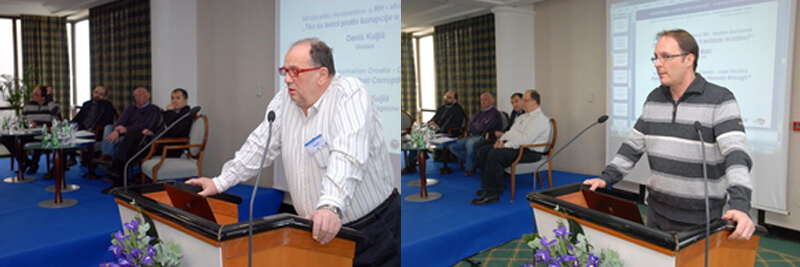
Globus magazine journalist Denis Kuljiš attempted in his presentation to answer the question: ‘Who are the fighters against corruption in Croatian media?’ His starting point was the claim that the most visible contribution to the fight against corruption is the one made by journalists. But journalists and media campaigns are managed by editors. Their engagement is crucial to the success of the anti-corruption struggle. A successful editor has to be autonomous in relation to the publisher and enjoy authority among the journalists he is working with. However, above all, it is the owner of the media platform or business, whether private or government-owned, who has to establish an investigative format. These are very complex operations that require high concentration of financial and human resources of specialized journalists, redactors, analysts, editors and lawyers, who bring supreme social power to the publisher, the power which can change the balance between political parties in the society. According to Denis Kuljiš’s analysis, there are three basic evolutionary types or forms of anticorruption reporting. The first one is the ‘corruption affair’, a singular occurrence that attracts enormous publicity at different media platforms. The second and higher-level is the ‘media campaign’, previously known as ‘media harangue’, while the third and the highest-level is the ‘media storm’, which affects all platforms, spills into public political space and changes the perception of protagonists of political and economic life with significant repercussions.
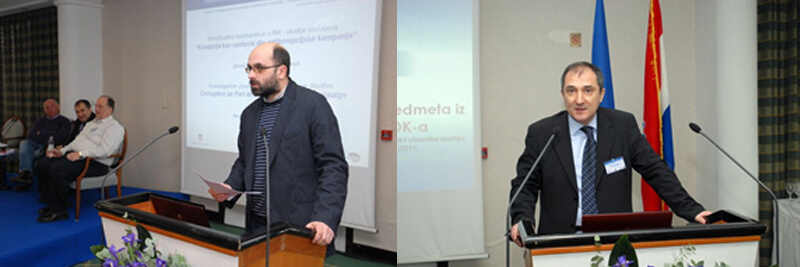
Novosti magazine editor-in-chief Ivica Đikić focused on corruption as the integral part of the anticorruption campaign. Daily and weekly newspapers in Croatia have for months been publishing confidential statements given by various suspects in different anticorruption investigations. Investigations are protected by their confidentiality, but selected statements are still published in newspapers on daily basis. Until now, newspapers have not published any confidential statements that would put in jeopardy any actions by the State Prosecutor’s Office; only those confidential information that are in favour of the prosecution have been published. Therefore, it is logical to make the conclusion that most likely; it’s either the State Prosecutor’s Office or someone who acts in the State Prosecutor’s Office best interest that is behind leaking confidential statements into newspapers. If we leave suspects’ and charged persons’ human rights aside, we come to the question why is it that newspapers agree to be a means in the hands of the prosecutor? Why do they allow a situation where every day someone is denying the main heading from yesterday’s cover page, while there is not one official source of information that would publicly verify its authenticity? It is clear what the State Prosecutor’s Office gains, but what do the newspapers gain? The newspapers think they gain on circulation, while in the long-term, as exactly proven by numbers and statistics, they lose both in terms of circulation and credibility. Credibility is lost over constant denials and journalists’ and editors’ lack of adherence to rules of their own trade; statements from one source (usually anonymous) are published daily, just like on a conveyor belt, distorted to the extent that they look more like a caricature of investigative journalism than real investigative journalism. Because of this frivolous and anti-trade approach, each next statement, no matter how serious it is, actually becomes irrelevant. And this is how credibility and then circulation are lost. Hence, editorial policy during the anticorruption campaign is largely based on the generosity of an (anonymous) source that will deliver ‘exclusive’ for the cover page, and the rest of the newspaper will somehow be filled. How to be objective towards a source that resolves journalists’ and editors’ everyday problems? Does the answer to that question lie in the fact that the newspaper that publishes confidential investigative statements for the most part is the one with no critical articles about the State Prosecutor’s Office? Are we witnessing corruption in the very centre of the anticorruption campaign?
Freelance journalist Dražen Rajković tried to make a comprehensive synthesis of Sanader’s octopus. At first, he listed the five main models for sucking money out of the public sector: flouting public procurement regulations and procedures, sucking money out of the public sector, favouritism during privatization, speculating with building land, and political corruption. During the six years of Sanader in power, all these models for sucking money out of the public sector accounted for a damage to the national budget of 88 billion kuna, which equals the total national budget in the first year of Sanader’s term, or three times the direct costs of the Homeland War. During the rest of his presentation, he set forth a detailed top 20 list of the biggest Sanader-era corruption affairs ranked according to damage they did to the national budget, together with the status of investigation they are in. Another interesting thing was a chronological overview of the 42 corruption affairs uncovered from the end of 2003 to 2010 with the names of journalists who revealed them. This was compared with the list of HND’s investigative journalism awards awarded in the same period. In the closing part of his presentation, called ‘never again’, Dražen Rajković proposed a set of measures that any future Croatian government should take in the field of political and economic reforms so as not to allow things like this to happen again.
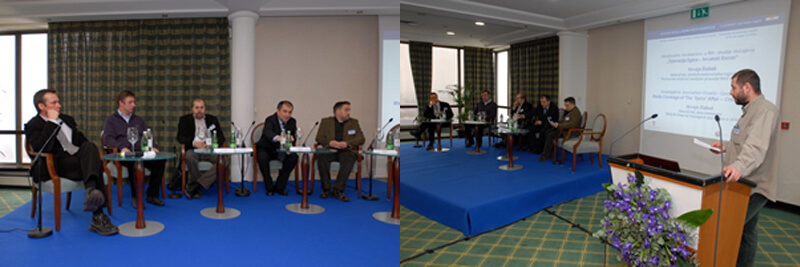
Večernji list journalistHrvoje Šlabek, who won the international award ‘Journalist courage’ for writing about the Podravka affair, gave a presentation entitled ‘Operation Spice – the Croatian Enron’. In his opinion, the ‘Spice’ affair is a good example of demystifying the motives that initiated an investigation into one of the biggest corruption-related cases in the post-Sanader Croatia. It did not come as a result of ‘the political will to fight corruption’, or the fact that USKOK had been given by the amended Criminal Code new, stronger tools for criminal prosecution. According to available information, the investigation was initiated after a tip-off from the Ministry of Finance on suspect relations between the Koprivnica-based food producer and the Split-based SMS company.
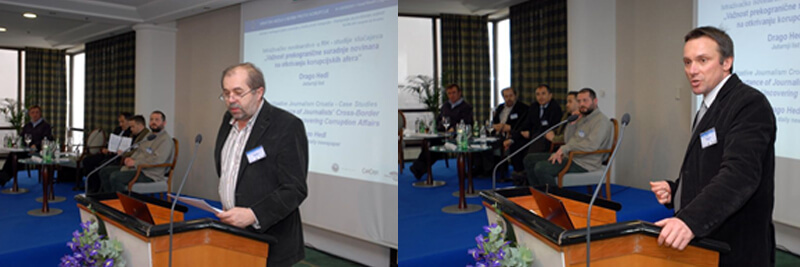
Jutarnji list journalist Drago Hedl gave a presentation entitled ‘The importance of journalist cross-border cooperation in uncovering corruption affairs. He started with the claim that mafia organizations in countries in the region have excellent cooperation. Also, police in these countries have recently begun to cooperate in fighting crime. At the same time, however, journalists from countries in the region hardly ever join their forces in working on corruption-related investigative stories, and even then, it is on a case-to-case basis. Hedl wondered why cooperation between journalists from different countries is so poor. The possible causes, in his opinion, include fighting for exclusivity, the costs that such investigation entails, as well as hesitation by journalists themselves to work on cross-border projects. Despite this, it is clear that journalists, when the topic they are dealing with requires so, can work better and more successfully in mixed teams than in isolation. Articles from colleagues in the region are used, often without citing the source, instead of cooperating by working on the same topic. Using the positive example of writing about the theft that involved both Croatian Railways and Serbian Railways, Hedl ended his presentation with the conclusion that better cross-border cooperation among journalists would certainly result in a higher number of uncovered corruption affairs.
Novi list journalist Boris Pavelić gave a presentation entitled ‘How big companies manipulate the media’. It is obvious, he pointed out, that the conflict between the advertisers and the publisher’s freedom of speech results in the latter being on the receiving end. Pavelić analysed a recent example of open blackmailing of a publisher by a big advertiser, who made it clear that their marketing cooperation would come to an end should the publisher continue writing the way the advertiser did not like. Pavelić concluded by saying that pressure from advertisers presents a big obstacle to objective reporting and uncovering corrupt conduct.
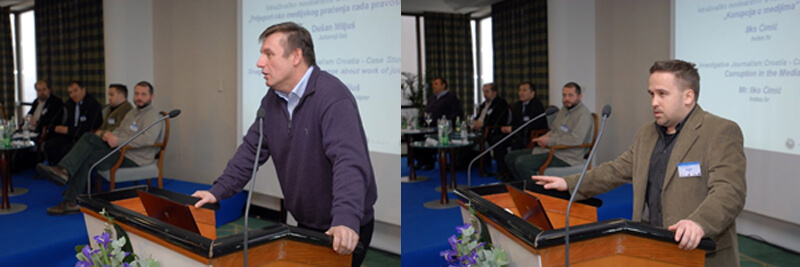
Jutarnji list journalist Dušan Miljuš said that the problems related to covering actions by judicial bodies cannot be solved by limiting media access to information. As for all the talk during the first two days of the conference about leaking information, Miljuš said that would always be the case, and that it is the institutions owning that information that bear prime responsibility for keeping them. In investigative proceedings there are situations in which the interest of the public justifies publicizing such information. At the same time, journalists must be aware that there are situations when publicizing such information may endanger not only the investigation, but human lives as well! And that is the line that should never be crossed. However, both the media and the judiciary must show understanding for the rules of the profession and respect each other. Prejudices should be avoided in this: both those in the judiciary about the media, and those in the media about the judiciary.
Index.hr portal journalist Ilko Ćimić stressed in his presentation the existence of corruption in the media themselves, with some media owners as parts of the profit-making corruption chain. In his opinion, the fight against corruption has affected a large part of society, but has not, unfortunately, been transferred enough into the media arena, which in Ćimić’s opinion, makes the media the worst element of Sanader’s legacy. He condemned the fact that his colleagues do not publish articles about media owners, in particular about EPH co-owner Ninoslav Pavić, who had been involved in the suspect privatization of Slobodna Dalmacija, although many authentic documents about the purchase of this Split-based daily have been publicized. Furthermore, there had been no reports about Novi list owner Robert Ježić before his recent arrest. Ćimić asked why Croatian media publish nothing or very little about the Hypo Bank affair, which he called ‘mother of all affairs and the origin of corruption’. In the end, Ćimić concluded that even though the ringleader was down, the media system remained the same, waiting for a new boss, another Sanader. Since numerous and quite different opinions had been heard during the two days of the conference, it was decided that no binding conclusions would be adopted.
Yet, in most presentations there were several recommendations to Croatian journalists, editors, publishers and media owners, as well as public officials:
Source: Official Press release of the Project ‘Strengthening Anti-Corruption Inter-Agency Cooperation – Awareness Raising Campaign’ financed through the EU IPA 2007 program for Croatia and implemented for the Croatian Ministry of Justice
The current state of investigative journalism in Croatia
Zagreb, January 2011
Source: Analysis of the current state of investigative journalism in Croatia was developed as a part of the project ‘Strengthening Anti-corruption Inter-agency Cooperation – Awareness Raising Campaign, led by Key experts Constantin Palicarsky and Ksenija Renko.


Ksenija Renko
Chief Executive Officer & Strategic Communications Consultant
JUPITER Strategic Consulting Ltd.
Ksenija Renko is a seasoned communications expert with over 25 years of experience, recognized for her expertise and extensive contributions to strategic communications and communication management. Her work has been pivotal in shaping and executing strategic communication efforts for high-profile donor-funded initiatives and European Union projects, particularly those tied to the EU accession processes and justice sector reforms in Croatia, Serbia, Bosnia, and Herzegovina, Turkey, Albania, and Kosovo. Her leadership in developing and implementing communication strategies for anti-corruption campaigns across Central and Eastern Europe underscores her expertise in managing complex, multifaceted communication endeavors.
With a robust portfolio of achievements, Ksenija has helped design and implement numerous communication and visibility policies and strategies, as well as online communication and social media campaigns in Croatia and Southeast Europe. She has also provided expert services in reputation management and crisis management, encompassing problem identification, on-site crisis support, and client guidance through restructuring, mergers, acquisitions, and stakeholder relations mediation.
As a trainer with over 15 years of experience, she has delivered comprehensive training programs for public officials across Albania, Bulgaria, Bosnia and Herzegovina, Croatia, Georgia, Kosovo, North Macedonia, Serbia, and Turkey. Notably, she has expanded her reach globally, conducting Public Outreach and Communication training for public officials of the African Judicial Exchange Network, representing Gambia, Ghana, Kenya, Nigeria, Tanzania, and Uganda. Her training expertise encompasses diverse topics, including strategic communications, crisis management, internal and external communications, and effective use of social media.
Ksenija’s professional leadership extends to her founding role as the Managing Director of Publicis Consultants Zagreb, Adriatic Hub, under the esteemed Publicis Groupe. Currently, she leads Jupiter Strategic Consulting Ltd., an agency specializing in strategic communications and communication management.
As an active participant in global networks, Ksenija Renko has played a key role in creating innovative resources, including the Practical Guidelines on the Use of Social Media by Judges. This pioneering document, specifically designed for the Central and Eastern European context, was published by the CEELI Institute in Prague.
Ksenija Renko has been a lecturer at the University of Dubrovnik, teaching PR Campaign Management and Integrated Marketing Communications courses.
Ksenija has held several key positions within professional associations, including President, Vice President, and board member of the Croatian Public Relations Association. Her dedication to advancing the public relations profession has earned her lifetime honorary membership in the prestigious CEE association PrOACTIVE CLUB PROven in ACTion and Venture. She also holds honorary membership in the Serbian Association of Public Relations. Additionally, she has been recognized as an Honorary Member of the Jury for the BAPRA Bright Awards in Sofia, Bulgaria. Her pioneering work and lasting contributions to the profession have been honored with prestigious awards.
Ksenija holds a Master’s in Humanities and Social Sciences and has also studied Postgraduate Specialist Studies in Business Marketing at the Faculty of Economics and Business, University of Zagreb.